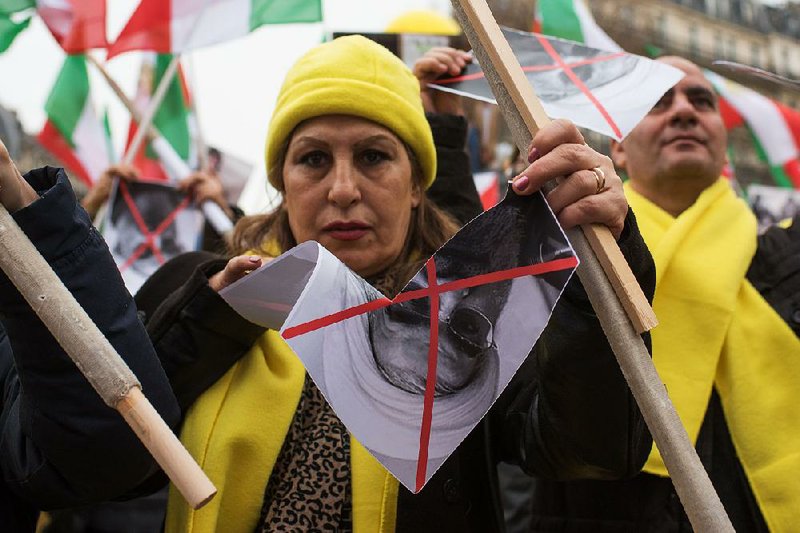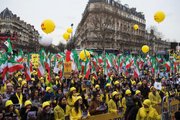PARIS -- France's government welcomed Iranian President Hassan Rouhani on Thursday with promises of a new beginning in an old relationship, starting with investments to boost Iran's flagging economy, which has been crippled by decades of sanctions.
"It's a new chapter of our relationship," French President Francois Hollande said in a joint news conference after a two-hour meeting with Rouhani at the Elysee Palace. "I want that relationship to be useful, useful to both countries, useful to the [Middle East] region affected by wars, crises and tragedies."
Hollande added that he raised the issues of human rights and freedom during the meeting.
France sees the visit also as an opportunity to draw Iran into a role of crisis-solving, notably in Syria's civil war where Iran actively supports the government of President Bashar Assad, which Paris firmly opposes.
"We must fight terrorism" in Syria and Iraq, Rouhani said during the news conference. "We must help the Syrian people so that the Syrian people can build a sustainable future for the country," he said.
Rouhani condemned the sanctions that his country was under, saying history has shown that they "never worked." He said the nuclear deal that led to the lifting of sanctions this month can serve as a model for solutions in other crises, notably in the Middle East.
Twenty agreements were signed after Rouhani's meeting with Hollande.
Iran Air signed a deal to buy 118 aircraft from Airbus, valued at $25 billion. Many European airlines are looking into resuming flights to Iran, the state-owned Iran daily reported Thursday.
Iran quoted Mohammad Khodakarami, deputy head of Iran's civil aviation authority, as saying British Airways officials visited Tehran on Tuesday to discuss resumption of flights. He did not elaborate.
Khodakarami also said Air France and Dutch flagship KLM have already expressed their readiness to resume flights to Tehran. Air France said last month that it would resume flights to Tehran for the first time in more than seven years, starting in April.
British Airlines and KLM officials have said there are not yet concrete plans for resuming flights.
Earlier this week, Iran said it is also considering direct flights to the United States. Direct flights halted between the two countries more than three decades ago. Iran and the United States severed air links when Washington broke relations in 1979 after Iranian militants stormed the U.S. Embassy in Tehran and held the occupants hostage.
PSA Peugeot Citroen also announced a joint venture with Iran Khodro to produce latest-generation vehicles in Tehran by the end of 2017. The two plan to produce 200,000 cars a year at a plant near Tehran, but complete details were not immediately clear. Peugeot had a large stake in Iran's car market before the sanctions.
French and Iranian companies also signed agreements in the sectors of air and maritime transport, airports, health and agriculture. Oil and gas company Total inked a deal with the National Iranian Oil Co. to purchase crude oil.
The French presidency said the total amount of the deals signed during Rouhani's visit, including Airbus, could reach up to $32.8 billion.
Analysts have noted that the attraction of the Iranian market is clear. Iran, with about 80 million people, has a young and well-educated population, and its middle class is among the most vibrant -- and product-hungry -- in the region.
"Iran's needs are enormous," said Pierre Gattaz, head of France's Medef employers association. "The country is not starting from scratch. It has got a very educated workforce, a real development potential."
The France outreach trip faced some strains.
France has asked its European Union partners to consider new sanctions on Iran for its recent ballistic missile tests, officials told The Associated Press.
And the multibillion-dollar deals have stirred opposition from rights groups and activists. Some claim that Iran's crackdowns on political dissent, its anti-Israel diatribes and other internal pressures, such as rising executions, should be addressed as part of any new business outreach.
Iranian opposition group, the People's Mujahedeen of Iran, with headquarters outside Paris, held a demonstration, and 61 lawmakers signed an open letter to Hollande condemning Iran's human-rights record, with executions on the rise, and what it called its "strategy of chaos" in the Middle East.
An activist hung from a fake noose off a Paris bridge next to a banner that read: "Welcome Rouhani, Executioner of Freedom."
At the French Institute of International Relations, Rouhani took digs at the West, notably in regard to the migrant crisis. He pointed out that Europe is complaining about the number of refugees arriving on its territory while Iran is hosting 3 million Afghans "without complaining."
Information for this article was contributed by Elaine Ganley, Sylvie Corbet, Angela Charlton, Danica Kirka, Raf Casert, George Jahn and Nasser Karimi of The Associated Press; and by Brian Murphy of The Washington Post.
A Section on 01/29/2016

